22 may 2017
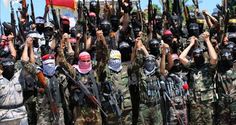
A number of Palestinian factions condemned on Sunday the latest statements by the US President Donald Trump which linked Hamas to terrorism and denounced his bias to Israel.
The factions said in separate statements that Trump's comments, in his speech on Sunday to the Arab-Islamic-American summit held with the participation of 55 Arab and Islamic leaders in Saudi Arabia, serve Israel and attempt to integrate it into the region.
The Islamic Jihad leader Khader Adnan said in a statement that accusing Hamas of terrorism in the presence of Arab leaders is a declaration of war against the Palestinian people and a criminalization of its legitimate resistance.
For its part, the Popular Front for the Liberation of Palestine condemned in a press release Trump's statements and added that the continued and unlimited US support for the Israel in its occupation of Palestine and non-compliance with the international legitimacy resolutions is what perpetuates terrorism.
The Palestinian al-Ahrar Movement considered Trump's description of Hamas as a form of terrorism a blatant attack on the Palestinian people and its legitimate resistance, stressing that the main enemy of the Arab and Islamic nation is Israel which represents the worst forms of terrorism.
The Movement said in a statement that there is an attempt to create new alliances based on escalating the sectarian conflicts in the Arab and Islamic countries to serve Israel and legitimize its presence in the region.
It warned against attempts to liquidate the Palestinian cause and portray it as an obstacle to co-existence with Israel rather than as a central issue that requires mobilizing all the nation's energies.
During his speech to the Arab-Islamic-American summit held in Saudi Arabia, Trump accused Hamas of being a terrorist movement saying, "ISIS, Hezbollah, al-Qaeda and Hamas represent different forms of terrorism."
The factions said in separate statements that Trump's comments, in his speech on Sunday to the Arab-Islamic-American summit held with the participation of 55 Arab and Islamic leaders in Saudi Arabia, serve Israel and attempt to integrate it into the region.
The Islamic Jihad leader Khader Adnan said in a statement that accusing Hamas of terrorism in the presence of Arab leaders is a declaration of war against the Palestinian people and a criminalization of its legitimate resistance.
For its part, the Popular Front for the Liberation of Palestine condemned in a press release Trump's statements and added that the continued and unlimited US support for the Israel in its occupation of Palestine and non-compliance with the international legitimacy resolutions is what perpetuates terrorism.
The Palestinian al-Ahrar Movement considered Trump's description of Hamas as a form of terrorism a blatant attack on the Palestinian people and its legitimate resistance, stressing that the main enemy of the Arab and Islamic nation is Israel which represents the worst forms of terrorism.
The Movement said in a statement that there is an attempt to create new alliances based on escalating the sectarian conflicts in the Arab and Islamic countries to serve Israel and legitimize its presence in the region.
It warned against attempts to liquidate the Palestinian cause and portray it as an obstacle to co-existence with Israel rather than as a central issue that requires mobilizing all the nation's energies.
During his speech to the Arab-Islamic-American summit held in Saudi Arabia, Trump accused Hamas of being a terrorist movement saying, "ISIS, Hezbollah, al-Qaeda and Hamas represent different forms of terrorism."
20 may 2017
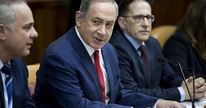
Israel expressed its anger after a White House video promoting US president Donald Trump's first foreign trip showed a map of Israel without the Palestinian areas that were occupied in 1967.
According to Ynet news website, right-wing justice minister Ayelet Shaked (Bayit Yehudi) lashed out at the White House for publishing a map of Israel without the West Bank, east Jerusalem, the Gaza Strip and the Golan Heights.
"I hope this is just ignorance and not policy," Shaked said.
Speaking at an event held on Friday in Tel Aviv’s Ramat Gan district, Shaked reminded her audience that her party was given a mandate to prevent the establishment of a Palestinian state.
"We were not elected to keep chairs warm, but rather to implement clear policy, ensure that no Palestinian state is established and to ensure that the (US) embassy is moved (to Jerusalem)," she said.
According to Ynet news website, right-wing justice minister Ayelet Shaked (Bayit Yehudi) lashed out at the White House for publishing a map of Israel without the West Bank, east Jerusalem, the Gaza Strip and the Golan Heights.
"I hope this is just ignorance and not policy," Shaked said.
Speaking at an event held on Friday in Tel Aviv’s Ramat Gan district, Shaked reminded her audience that her party was given a mandate to prevent the establishment of a Palestinian state.
"We were not elected to keep chairs warm, but rather to implement clear policy, ensure that no Palestinian state is established and to ensure that the (US) embassy is moved (to Jerusalem)," she said.
6 may 2017
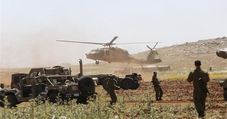
The Israeli air force will conduct joint drills next week with its US counterpart, according to Hebrew media on Friday.
The Hebrew newspaper Haaretz said that the US sent a number of F-15 fighter jets to Israel to participate in the joint drills.
Haaretz reported that the drills include joint exercises by US and Israeli pilots on how to counter hostile aircraft.
The paper pointed out that the Israeli air force has recently participated in joint exercises with air forces from Greece in addition to taking part in the Red Flag maneuvers with air forces from the US and the United Arab Emirates in which pilots from Pakistan and Spain participated.
Joint air force exercises will be held in Israel in November 2017 in which pilots from several foreign countries including India, US, Poland and Italy will participate, according to the paper.
Two years ago, the Israeli air force signed a strategic cooperation agreement with its US counterpart to promote joint activities between the two armies.
The Hebrew newspaper Haaretz said that the US sent a number of F-15 fighter jets to Israel to participate in the joint drills.
Haaretz reported that the drills include joint exercises by US and Israeli pilots on how to counter hostile aircraft.
The paper pointed out that the Israeli air force has recently participated in joint exercises with air forces from Greece in addition to taking part in the Red Flag maneuvers with air forces from the US and the United Arab Emirates in which pilots from Pakistan and Spain participated.
Joint air force exercises will be held in Israel in November 2017 in which pilots from several foreign countries including India, US, Poland and Italy will participate, according to the paper.
Two years ago, the Israeli air force signed a strategic cooperation agreement with its US counterpart to promote joint activities between the two armies.
28 apr 2017
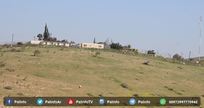
US president Donald Trump will soon reverse a longstanding US policy by officially recognizing the entire city of Jerusalem as the capital of Israel, according to Yedioth Ahronoth newspaper on Thursday.
However, he will not implement his election campaign pledge to relocate the American embassy from Tel Aviv to Jerusalem during his upcoming visit in late May, the newspaper added.
He is also expected to express support for the establishment of a Palestinian state alongside Israel, the paper noted.
Under a previous US policy, the city of Jerusalem was not recognized as the capital of Israel, as all former administrations did not recognize any party as sovereign in any part of Jerusalem.
In a related context, Trump will be hosting Palestinian Authority chief Abbas at the White House next week.
However, he will not implement his election campaign pledge to relocate the American embassy from Tel Aviv to Jerusalem during his upcoming visit in late May, the newspaper added.
He is also expected to express support for the establishment of a Palestinian state alongside Israel, the paper noted.
Under a previous US policy, the city of Jerusalem was not recognized as the capital of Israel, as all former administrations did not recognize any party as sovereign in any part of Jerusalem.
In a related context, Trump will be hosting Palestinian Authority chief Abbas at the White House next week.
7 apr 2017
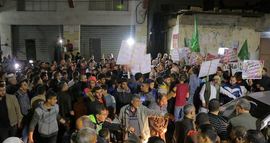
Scores of Palestinian citizens on Thursday evening participated in a sit-in staged in solidarity with Ahmed al-Ghandour, a commander of al-Qassam Brigades of Hamas, after he was added to the US department of state’s terror list.
The sit-in took place outside the house of Ghandour north of Gaza, where the participants carried pictures of the commander and placards condemning the US decision and defending the Palestinian people’s right to resist the Israeli occupation.
Some of the banners defended al-Qassam Brigades and described it as “the honor of the nation” and one questioned, “How can defending our land and holy sites be terrorism?"
Member of Hamas’s political bureau Fathi Hammad, who was added to the same list in September 2016, also joined the rally outside the house.
In a speech, senior Hamas official Mushir al-Masri stressed that such US decision would not intimidate his Movement and its leaders and dissuade them from their legitimate resistance of the occupation, affirming that terrorism is committed by Israel.
The sit-in took place outside the house of Ghandour north of Gaza, where the participants carried pictures of the commander and placards condemning the US decision and defending the Palestinian people’s right to resist the Israeli occupation.
Some of the banners defended al-Qassam Brigades and described it as “the honor of the nation” and one questioned, “How can defending our land and holy sites be terrorism?"
Member of Hamas’s political bureau Fathi Hammad, who was added to the same list in September 2016, also joined the rally outside the house.
In a speech, senior Hamas official Mushir al-Masri stressed that such US decision would not intimidate his Movement and its leaders and dissuade them from their legitimate resistance of the occupation, affirming that terrorism is committed by Israel.
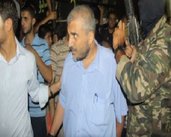
The United States is hitting al-Qassam Brigades, the armed wing of Hamas Movement, commander Ahmad al-Ghandour with terrorism sanctions.
The State Department said it is designating Abu Anas al-Ghandour as a global terrorist. The designation freezes any assets in the U.S. and bars Americans from doing business with him.
Ghandour leads al-Qassam brigades in northern Gaza and spent years in Israeli and Palestinian Authority prisons decades ago. Israeli authorities accused him of the involvement in an attack on an Israeli military outpost on the Israel-Gaza border that killed two Israeli soldiers.
The attack led to the kidnapping of Israeli soldier Gilad Shalit. The soldier was released in a 2011 prisoner swap.
He was subjected to two assassination attempts in 2002 and 2012. Ghandour is the fifth resistance official whose name is listed in the U.S. terrorism list after al-Qassam leaders: Mohammad al-Deif, Yahya al-Sinwar, Rouhi Mushtaha, and the Hamas leader Fathi Hammad.
The State Department said it is designating Abu Anas al-Ghandour as a global terrorist. The designation freezes any assets in the U.S. and bars Americans from doing business with him.
Ghandour leads al-Qassam brigades in northern Gaza and spent years in Israeli and Palestinian Authority prisons decades ago. Israeli authorities accused him of the involvement in an attack on an Israeli military outpost on the Israel-Gaza border that killed two Israeli soldiers.
The attack led to the kidnapping of Israeli soldier Gilad Shalit. The soldier was released in a 2011 prisoner swap.
He was subjected to two assassination attempts in 2002 and 2012. Ghandour is the fifth resistance official whose name is listed in the U.S. terrorism list after al-Qassam leaders: Mohammad al-Deif, Yahya al-Sinwar, Rouhi Mushtaha, and the Hamas leader Fathi Hammad.
6 apr 2017
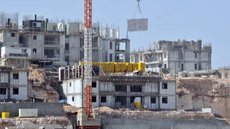
On Wednesday, the 5th of April, U.S. President Donald Trump and Jordan’s King Abdullah II both took part in a joint press conference in Washington D.C., where they discussed issues including the Middle East; Syria, Palestine and Israel were the primary focus.
Trump and Abdullah II both used the press conference to condemn the chemical attacks in Syria, according to the PNN, with Trump stating: “It crossed a lot of lines for me. When you kill innocent children, innocent babies — babies, little babies — with a chemical gas that is so lethal — people were shocked to hear what gas it was — that crosses many, many lines, beyond a red line. Many, many lines.”
King Abdullah II expressed his ‘gratitude towards Trump for his involvement in the Middle East and his eagerness to solve the core conflict in the region’, referring to the Israeli-Palestinian conflict.
Donald Trump said, “Finally, we discussed to advance the cause of peace in the Middle East, including peace between the Israelis and Palestinians. And, I’m working very, very hard on trying to finally create peace between the Palestinians and Israel, and I think we’ll be successful.”
The meeting between Donald Trump and King Abdullah II were the second since Donald Trump was inaugurated as president.
Trump and Abdullah II both used the press conference to condemn the chemical attacks in Syria, according to the PNN, with Trump stating: “It crossed a lot of lines for me. When you kill innocent children, innocent babies — babies, little babies — with a chemical gas that is so lethal — people were shocked to hear what gas it was — that crosses many, many lines, beyond a red line. Many, many lines.”
King Abdullah II expressed his ‘gratitude towards Trump for his involvement in the Middle East and his eagerness to solve the core conflict in the region’, referring to the Israeli-Palestinian conflict.
Donald Trump said, “Finally, we discussed to advance the cause of peace in the Middle East, including peace between the Israelis and Palestinians. And, I’m working very, very hard on trying to finally create peace between the Palestinians and Israel, and I think we’ll be successful.”
The meeting between Donald Trump and King Abdullah II were the second since Donald Trump was inaugurated as president.
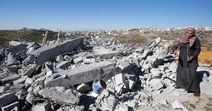
Palestinian organizer Mohammed Khatib, the Europe coordinator of Samidoun Palestinian Prisoner Solidarity Network, was denied a visa to the United States, where he had been invited to speak at the Jewish Voice for Peace National Membership Meeting, which took place in Chicago from 31 March to 2 April. Along with Black4Palestine organizer Kristian Davis Bailey, Mohammed is working on a project to build Black-Palestinian transnational solidarity between liberation movements, focusing on youth organizing.
Additional events in the United States, focusing on Palestinian political prisoners, the struggle for justice in Palestine, Black/Palestinian transnational organizing and liberation struggle and the struggle of refugees – from the urgent need to fight racism in Europe today to Palestinian refugees’ right to return – were also being planned for Mohammed.
Mohammed is himself a Palestinian refugee from Ein el-Helweh refugee camp in Lebanon. A Convention-recognized refugee, the mere sight of his Belgium-issued refugee travel document led visa processing staff members at the U.S. Embassy in Athens, Greece to deny his travel to the US, rejecting even a review of his invitation letters and travel program scheduled in the United States.
As Davis Bailey spoke at the JVP plenary on Sunday, 2 April, he said:
I would like to start by bringing into the room my dear friend and comrade Mohammed Khatib, who was scheduled to join us in person on this panel. Mohammed is the European coordinator of the Samidoun Palestinian Prisoner Solidarity Network and a Palestinian refugee from Lebanon. It is explicitly because of his status as a refugee that he was refused the opportunity to even interview for a visa to the US. “There is nowhere to deport you to,” the embassy told him.
This would have been Mohammed’s first time to the US and he was very eager to engage the membership of Jewish Voice for Peace as a refugee in exile, and as a descendant of survivors of the Nakba. He was subject to the double violence of being denied access to his homeland by Israel and being denied the ability to travel because of his status as a refugee by the US.
Next year marks 70 years since the Nakba. As a solidarity movement we have to take seriously that the majority of Palestinians are refugees in exile and that the end of the occupation or even creation of a Palestinian state does not resolve the fundamental injustice they experienced. We need broad and massive commemorations of the Nabka and to expose the crimes and outcome of the Nakba as the fundamental root of this conflict. We need campaigns and demonstrations to end Israel’s “Palestinian ban” with the same amount of fervor as we rallied at airports against the US’s “Muslim ban.” We cannot abandon the right of return.
The denial of Mohammed Khatib’s visa is, of course, not at all an individual case, but part and parcel of long-time United States policies of ideological exclusion and racist profiling as well as refusal to recognize the rights of refugees. Palestinians traveling to the United States for public events or speaking tours have long faced the threat and the reality of visa denial based on ideological exclusion or racist categories of “suspicion.” The recent intensification of the “Muslim Ban” and promotion of anti-refugee, anti-Arab and anti-Muslim propaganda in order to justify the exclusion of peoples – often not people coming for events or speaking engagements, but people being denied access to their families, their education or simply a place of refuge from war and occupation – only underlines this ongoing and long-term policy of exclusion and deportation.
The denial of a visa to Mohammed also represents the blows suffered by the growing U.S. movement for justice in Palestine due to the constant barriers erected by the U.S., Israeli and other states designed to prevent interaction among Palestinians across national borders, and between Palestinian, Arab and international movements for justice and liberation, from denial of entry to deportation to so-called “anti-terror” laws that terrorize communities and movements. While Skype and video links allow communication to continue across borders, they are not a replacement for the benefit of face-to-face interaction and movement-building.
Samidoun Palestinian Prisoner Solidarity Network denounces the denial of a visa to Mohammed Khatib, as part and parcel of the racist U.S. visa and entry policy that has impacted millions of people around the world – not only since the beginning of the Trump administration, but as a long-term policy stretching over decades. This visa denial is far from an individual case and represents an ongoing aspect of a policy of racism, ideological exclusion and separation and fragmentation of Palestinians from one another and from their national liberation movement.
Mohammed Khatib is available for Skype discussions or video presentations to organizations in the United States and elsewhere who would like to hear his perspective on the Palestinian struggle today, Palestinian political prisoners and Black/Palestinian solidarity. To arrange a video presentation, please email [email protected] or contact us on Facebook.
Video
Additional events in the United States, focusing on Palestinian political prisoners, the struggle for justice in Palestine, Black/Palestinian transnational organizing and liberation struggle and the struggle of refugees – from the urgent need to fight racism in Europe today to Palestinian refugees’ right to return – were also being planned for Mohammed.
Mohammed is himself a Palestinian refugee from Ein el-Helweh refugee camp in Lebanon. A Convention-recognized refugee, the mere sight of his Belgium-issued refugee travel document led visa processing staff members at the U.S. Embassy in Athens, Greece to deny his travel to the US, rejecting even a review of his invitation letters and travel program scheduled in the United States.
As Davis Bailey spoke at the JVP plenary on Sunday, 2 April, he said:
I would like to start by bringing into the room my dear friend and comrade Mohammed Khatib, who was scheduled to join us in person on this panel. Mohammed is the European coordinator of the Samidoun Palestinian Prisoner Solidarity Network and a Palestinian refugee from Lebanon. It is explicitly because of his status as a refugee that he was refused the opportunity to even interview for a visa to the US. “There is nowhere to deport you to,” the embassy told him.
This would have been Mohammed’s first time to the US and he was very eager to engage the membership of Jewish Voice for Peace as a refugee in exile, and as a descendant of survivors of the Nakba. He was subject to the double violence of being denied access to his homeland by Israel and being denied the ability to travel because of his status as a refugee by the US.
Next year marks 70 years since the Nakba. As a solidarity movement we have to take seriously that the majority of Palestinians are refugees in exile and that the end of the occupation or even creation of a Palestinian state does not resolve the fundamental injustice they experienced. We need broad and massive commemorations of the Nabka and to expose the crimes and outcome of the Nakba as the fundamental root of this conflict. We need campaigns and demonstrations to end Israel’s “Palestinian ban” with the same amount of fervor as we rallied at airports against the US’s “Muslim ban.” We cannot abandon the right of return.
The denial of Mohammed Khatib’s visa is, of course, not at all an individual case, but part and parcel of long-time United States policies of ideological exclusion and racist profiling as well as refusal to recognize the rights of refugees. Palestinians traveling to the United States for public events or speaking tours have long faced the threat and the reality of visa denial based on ideological exclusion or racist categories of “suspicion.” The recent intensification of the “Muslim Ban” and promotion of anti-refugee, anti-Arab and anti-Muslim propaganda in order to justify the exclusion of peoples – often not people coming for events or speaking engagements, but people being denied access to their families, their education or simply a place of refuge from war and occupation – only underlines this ongoing and long-term policy of exclusion and deportation.
The denial of a visa to Mohammed also represents the blows suffered by the growing U.S. movement for justice in Palestine due to the constant barriers erected by the U.S., Israeli and other states designed to prevent interaction among Palestinians across national borders, and between Palestinian, Arab and international movements for justice and liberation, from denial of entry to deportation to so-called “anti-terror” laws that terrorize communities and movements. While Skype and video links allow communication to continue across borders, they are not a replacement for the benefit of face-to-face interaction and movement-building.
Samidoun Palestinian Prisoner Solidarity Network denounces the denial of a visa to Mohammed Khatib, as part and parcel of the racist U.S. visa and entry policy that has impacted millions of people around the world – not only since the beginning of the Trump administration, but as a long-term policy stretching over decades. This visa denial is far from an individual case and represents an ongoing aspect of a policy of racism, ideological exclusion and separation and fragmentation of Palestinians from one another and from their national liberation movement.
Mohammed Khatib is available for Skype discussions or video presentations to organizations in the United States and elsewhere who would like to hear his perspective on the Palestinian struggle today, Palestinian political prisoners and Black/Palestinian solidarity. To arrange a video presentation, please email [email protected] or contact us on Facebook.
Video
